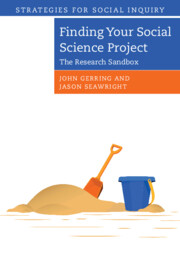
-
Select format
-
- Publisher:
- Cambridge University Press
- Publication date:
- October 2022
- October 2022
- ISBN:
- 9781009118620
- 9781009100397
- 9781009114912
- Dimensions:
- (244 x 170 mm)
- Weight & Pages:
- 0.78kg, 354 Pages
- Dimensions:
- (244 x 170 mm)
- Weight & Pages:
- 0.6kg, 354 Pages
- Subjects:
- Research Methods in Politics, Research Methods in Sociology and Criminology, Research Methods In Sociology and Criminology, Qualitative Research Methods, Research Methods In Politics
- Series:
- Strategies for Social Inquiry
You may already have access via personal or institutional login- Subjects:
- Research Methods in Politics, Research Methods in Sociology and Criminology, Research Methods In Sociology and Criminology, Qualitative Research Methods, Research Methods In Politics
- Series:
- Strategies for Social Inquiry
Book description
The most important step in social science research is the first step – finding a topic. Unfortunately, little guidance on this crucial and difficult challenge is available. Methodological studies and courses tend to focus on theory testing rather than theory generation. This book aims to redress that imbalance. The first part of the book offers an overview of the book's central concerns. How do social scientists arrive at ideas for their work? What are the different ways in which a study can contribute to knowledge in a field? The second part of the book offers suggestions about how to think creatively, including general strategies for finding a topic and heuristics for discovery. The third part of the book shows how data exploration may assist in generating theories and hypotheses. The fourth part of the book offers suggestions about how to fashion disparate ideas into a theory.
Reviews
‘Exploration and inspiration are necessary to locate a good social science topic; and this book tells you why and shows you how. Playful and insightful; highly recommended.’
Richard Swedberg - Cornell University, New York
‘This innovative book endorses diverse approaches to focusing research projects: induction from data, deduction from theory, concentration on data that lends itself to strong causal inference (for example, natural experiments), and concern with explaining major events in the world. The book is engagingly written and will be an excellent text in the classroom. Bravo for Gerring and Seawright!’
David Collier - UC Berkeley
Contents
Metrics
Altmetric attention score
Full text views
Full text views help Loading metrics...
Loading metrics...
* Views captured on Cambridge Core between #date#. This data will be updated every 24 hours.
Usage data cannot currently be displayed.
Accessibility standard: Unknown
Why this information is here
This section outlines the accessibility features of this content - including support for screen readers, full keyboard navigation and high-contrast display options. This may not be relevant for you.
Accessibility Information
Accessibility compliance for the PDF of this book is currently unknown and may be updated in the future.


